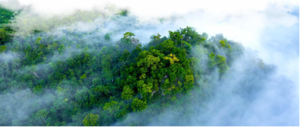By Mohamed Ismail Kamara
Executive Director
Stichting EcoProbe Africa
The Netherlands
September 2025
I have never been to Kabala, but people often tell me it was once a cold, green town, surrounded by thick forests. From Kabala to Pujehun to Port Loko, vast canopies once blanketed the land. Today, almost all of that has vanished. The greed of some Sierra Leoneans, coupled with corruption among government officials and the influx of Chinese timber businesses, has fueled this destruction. Much of this timber feeds the ever-growing demand in China.

The consequences have been brutal. Entire towns and villages that were once bordered by lush forests now sit in open, barren fields. As I often say: cutting trees today is stealing from our children’s plates tomorrow.
Sierra Leone faces a difficult balancing act,pursuing economic development while trying to protect its fragile environment. Our forests, once symbols of natural wealth and cultural heritage, are disappearing at an alarming rate. By 2022, only 34.57% of our forest cover remained, with over 35% of total tree cover lost since 2000. The urgency to act has never been greater.
Forests are Sierra Leone’s lifeline. They sustain biodiversity, regulate water systems, and support millions of livelihoods. Yet rampant illegal logging, unsustainable farming, and charcoal production have caused severe degradation. The Western Area Peninsula National Park alone lost 5,600 hectares of forest between 2012 and 2024. Even the Tacugama Chimpanzee Sanctuary home to over 100 endangered chimpanzees is threatened by land grabs and encroachment. These losses are not just environmental; they erode our culture, our economy, and our future.
For many rural families, the destruction is tied to survival. Economic pressures force people into harmful practices like slash-and-burn farming and charcoal burning. According to Green Amazon News, widow Aminata Sankoh, who resorted to illegal charcoal production to provide for her seven children, exemplifies the heartbreaking struggles faced by many vulnerable families. But these short-term coping mechanisms worsen long-term poverty and environmental decline.
The impacts are devastating. Sierra Leone ranks among the world’s most climate-vulnerable nations. Deforestation exacerbates this vulnerability, leading to erratic rainfall, prolonged droughts, and soil erosion. The 2017 mudslide on Mount Sugar Loaf, which killed over 1,000 people, was directly linked to deforestation and unchecked urban expansion. In the Gola Rainforest shared with Liberia and home to over 300 bird species, endangered pygmy hippos, and forest elephants illegal logging and land seizures are shrinking ecosystems, reducing biodiversity, and weakening resilience against climate shocks.
The economic costs are equally severe. The World Bank warns that climate impacts could slash Sierra Leone’s GDP by 9–10% by 2050, pushing an additional 600,000 people into poverty. Deforestation also limits our ability to tap into carbon credit markets, like the Gola Rainforest carbon project, which could generate sustainable income for local communities.
Yet there is hope. Across the country, community-led initiatives, policy reforms, and international partnerships are making a difference. In Bo and Moyamba Districts, for example, partnerships between the FAO and Njala University have empowered villagers to manage forests sustainably. Beekeeping, tree nurseries, and climate-smart agriculture have not only improved incomes but also helped restore forest cover. Quoting from the UN-REDD Programme, one farmer, Mohammed Kamara, proudly said: “Our forest is thicker, greener… we see more wildlife returning.”
The government is also taking action. The Ministry of Environment and Climate Change has launched the Protect Sierra Leone program, focusing on biodiversity conservation, community forests, and affordable alternatives to charcoal. President Julius Maada Bio’s task force on illegal logging, along with plans for the first comprehensive forest inventory since 1975, are promising steps toward accountability and reform.
Regional collaboration adds another layer of optimism. The GOLA-REAP initiative, a partnership with Liberia, aims to transform the Gola Rainforest into a transboundary peace park, linking conservation with regional stability.
To secure our future, we must prioritize green finance. Sierra Leone will need an estimated $39 billion by 2050 to fund its green transition. Capacity-building workshops led by the UN Economic Commission for Africa are already helping stakeholders understand carbon markets, green bonds, and debt-for-nature swaps—but these efforts must be scaled up urgently.
Sierra Leone stands at a crossroads. We must choose between short-term exploitation and long-term stewardship. This requires stronger enforcement against illegal logging and corruption, investment in clean energy to reduce reliance on charcoal, and the creation of green jobs in agroforestry and eco-tourism. Environmental education should be integrated into schools and amplified through the media to foster a culture of conservation.
As Executive Director of EcoProbe Africa, I have witnessed the devastating effects of deforestation firsthand. The sight of trucks loaded with timber speeding toward the ports, the sound of power saws buzzing through what used to be thriving forests these moments sink my heart. Many have grown wealthy from this theft, but the cost to our nation is immeasurable.
Yet, even in this crisis, I have also seen hope. I have witnessed the resilience of communities fighting to protect their forests and the determination of young people demanding change. Many environmental groups have emerged, and this is a positive step toward putting pressure on the government to reinstate the ban on timber harvesting. These efforts remind us that a sustainable future is possible if we act now. The forest can regenerate .I have no doubt about it,but what remains must be protected. A strong step forward would be for the government to reimpose the ban.
Our forests are not just natural resources; they are our legacy. It is our collective responsibility to protect them, for ourselves and for generations yet unborn
About the Author
Mohamed Ismail Kamara is the Executive Director of Stichting EcoProbe Africa, a Netherlands-based organization raising awareness about environmental degradation, climate change, health, artificial intelligence, and sustainable development in Sub-Saharan Africa. Contact: ecoprobeafrica@gmail.com.